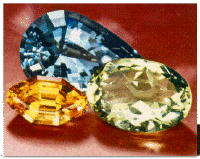Samson
Jewellery - Birth Stone
May / Emerald

These stones are linked with Cleopatra, and the emerald mine which bears her name, located in Egypt near the Red Sea, was rediscovered in 1818. It contains hundreds of shafts running into the hillside, some going down as deep as eight hundred feet. Ancient tools found on the site enabled the mine to be dated to 1650 BC or earlier. This mine was worked over a very long period and was the only known source of emerald in the Ancient World. It can be assumed that all the rather poor emeralds found in early jewellery came from it; those found on the site after its rediscovery were not very prepossessing, being rather pale and cloudy. Another early source of emeralds was a mine 7,500 feet up in the Austrian Alps near Salzburg: The Romans are believed to have discovered this mine and again most of the stones now found in it are pale and full of inclusions.
It was not until Pizarro conquered Peru in the sixteenth century and sent back emeralds recovered by the Columbian Indians in the Andes that people in the western world first appreciated how beautiful an emerald could be.